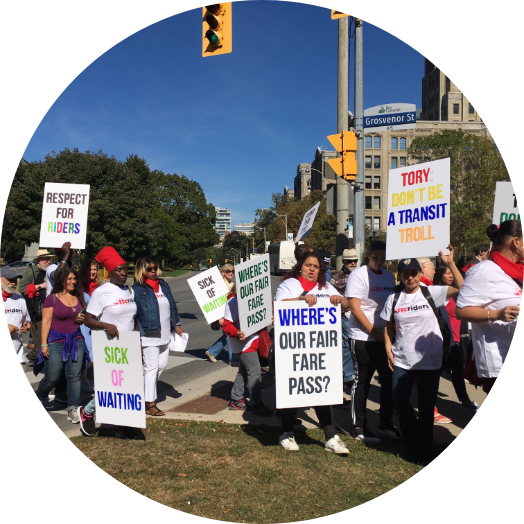Advocacy
PTP’s Teamwork program provides learners with real work experience through hands-on learning. Examples include planning and preparing a meal, running a snack shop, doing inventory control and coordinating and planning advocacy initiatives. This is the story of the Advocacy Team’s work, where learners are encouraged to build their workplace skills through civic engagement.
Spotting Barriers
The high cost of public transportation is a significant barrier for low-income earners and those on public assistance. Some of these individuals can spend up to 20% of their total income on transit, forcing many to choose between food or a bus ticket. That’s a tough choice when a person is trying to obtain job training, find work, go to the doctor, or simply enjoy leisure activities. The lack of affordable transit, coupled with the underlying issues of inadequate social assistance rates, low wages, and precarious employment, therefore has an important impact on the health and wellbeing of individuals and families. Poverty, precarious work, housing insecurity, food insecurity, and inadequate social assistance rates are the backdrop of our students’ lives.
Seeking Solutions
PTP’s Teamwork program provides students with the opportunity to learn important workplace and civic engagement skills by participating in community consultation processes and planning their own advocacy actions. PTP learners have supported the work of the Fair Fare Coalition, a grassroots organization that advocates for affordable TTC service; Commitment to Community and Social Planning Toronto, organizations engaging with the Toronto Poverty Reduction Strategy; and, earlier this year, the Ontario Federation of Labour and the Workers’ Action Centres support for Bill 148, the Fair Workplaces, Better Jobs Act.
Seeing Impact
Ongoing involvement from PTP students and staff at rallies, through deputations at City Hall, and in media interviews has had a deep and meaningful impact on how the issue of transit affordability is understood in Toronto. It has helped to shape the Fair Fare Coalition’s advocacy work and provided an opportunity for students to speak out on the issues that most affect their lives. In addition to raising awareness of the issues, these experiences help to improve students’ literacy and teach important workplace social and communication skills such as task planning, problem solving, and working together. Students feel they are making a difference in their community and take pride in their work, building confidence and demonstrating initiative as they learn.
